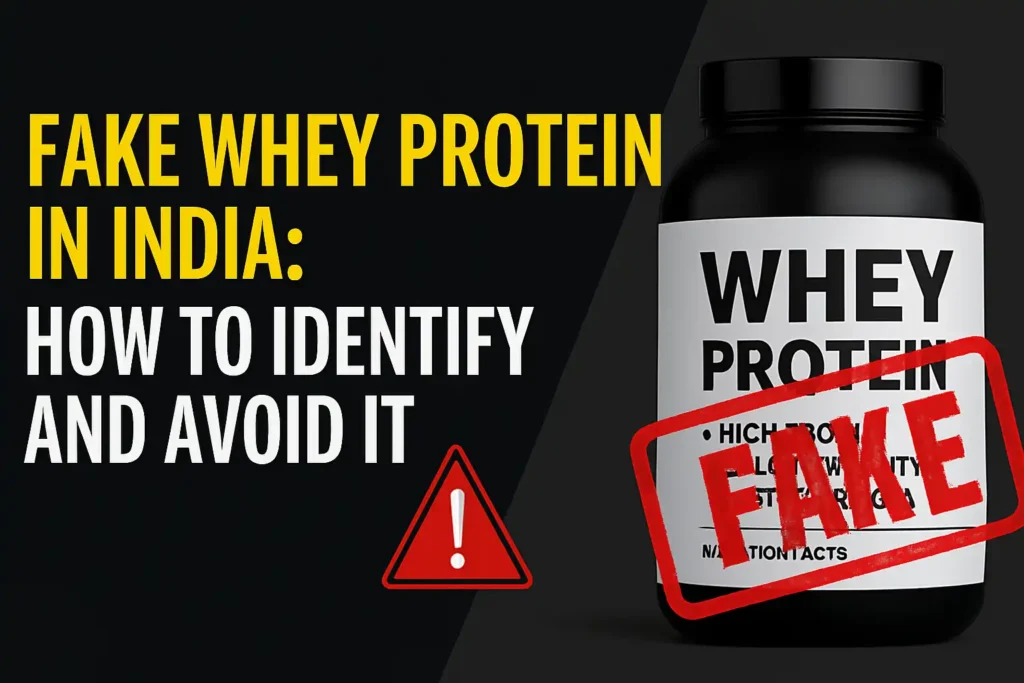Fake Whey Protein in India: The Hidden Truth of the Supplement Scam (2025 Edition)
In India’s fast-growing fitness culture, whey protein has become a household name. Every gym-goer, fitness influencer, and beginner lifter relies on protein shakes to fuel muscle growth. But behind the shiny packaging and impressive marketing lies a dark reality — the rise of fake whey protein.
Over the past few years, counterfeit protein powders have flooded the Indian market. What appears to be premium imported supplements are, in many cases, nothing more than cheap flour, sugar, or chemicals packed into glossy jars. And the consequences for your health can be dangerous — even life-threatening.
The Rise of Fake Whey Protein in India
A decade ago, only a handful of Indian gyms even knew what whey protein was. Today, the fitness supplement market in India is worth over ₹3,000 crore and growing rapidly. This growth has also created a parallel black market of fake products.
These duplicate supplements are often sold under the names of top international brands such as Optimum Nutrition (ON), Dymatize, MuscleTech, MyProtein, and even popular Indian brands like MuscleBlaze.
You might find them at unbelievably cheap prices — but remember, if it looks too good to be true, it probably is.
The Business of Fake Supplements
Fake whey protein isn’t made by amateurs mixing powders in a kitchen — it’s a multimillion-rupee underground business.
Here’s how it works:
- Counterfeiters buy empty jars or used containers of popular protein brands from gym dealers or scrap markets.
- They refill them with a mixture of flour, starch, soy powder, sugar, and flavoring chemicals.
- They reseal the containers using fake plastic lids and duplicate labels.
- These products are sold to unsuspecting customers through shady supplement stores and unverified online listings.
The profit margin? Up to 500%, since a ₹200 filler can be sold as a ₹4,000 imported protein jar.
Why India Is the Perfect Target for Fake Protein Sellers
India’s large population of new fitness enthusiasts, combined with a price-sensitive market, makes it a goldmine for counterfeiters. Many beginners don’t know how to verify authenticity, and most are attracted to discounted offers or “imported” labels without knowing how to check real importer details.
The lack of strict regulation adds to the problem. While agencies like FSSAI monitor food safety, enforcement in the supplement industry is weak. As a result, fake protein sellers operate freely both offline and online.
How Fake Whey Protein Looks “Real”
The biggest danger with fake whey protein is how authentic it looks.
Modern counterfeiters use high-quality printing, barcodes, and duplicate stickers that mimic genuine products almost perfectly.
Some fake jars even have:
- Correct spelling and branding
- QR codes that lead to clone websites
- Scratch codes that display “verified” messages
- Fake importer stickers with GST numbers copied from real importers
Only trained eyes — or proper verification — can tell the difference.
Shocking Facts About Fake Protein in India (2025 Data)
- Nearly 1 in 3 protein powders sold online in India are counterfeit or tampered.
- Optimum Nutrition (ON Gold Standard) is the most duplicated whey protein brand in India.
- Fake protein is often sold 20%–50% cheaper than the real one.
- Many counterfeit proteins are made using industrial starch and chalk powder, causing kidney and liver damage.
- In Mumbai, Delhi, and Bangalore, authorities have seized over 10,000+ fake supplement jars in the last two years.
The Impact of Fake Whey Protein on Your Body
When you invest in fake whey, you’re not just wasting money — you’re risking your body.
Fake or adulterated protein powders often contain unapproved sweeteners, cheap fillers, and chemical flavors. Over time, they can cause:
- Liver damage due to toxic additives
- Kidney strain from excess sugar and starch
- Acne and hormonal imbalance
- Stomach cramps, bloating, or nausea
- Muscle loss because there’s little to no real protein
- Low energy and fatigue
Many fake powders are even contaminated with bacteria due to poor hygiene during packaging.
How Fake Whey Protein Affects the Fitness Industry
Fake supplements not only harm individuals but also damage the reputation of legitimate brands. Genuine companies lose trust and sales when consumers have bad experiences with counterfeit products.
Trainers and gym owners also face challenges — when clients don’t see progress from fake supplements, they lose faith in protein powders altogether.
The overall fitness ecosystem suffers, creating confusion and mistrust.
Consumer Ignorance: The Real Fuel Behind the Fake Protein Market
Let’s face it — many of us have bought supplements without checking their authenticity. Most gym-goers simply trust the local “supplement guy” or pick the cheapest deal online.
This blind trust fuels the fake protein industry. In reality, a bit of awareness could save thousands of rupees and protect your health.
Signs That Your Whey Protein Might Be Fake
- Too Cheap To Be True – A 2lb ON Gold Standard whey protein for ₹1,800 is an instant red flag.
- Weird Texture – Grainy, sandy, or lumpy texture means it’s likely mixed with fillers.
- Chemical Smell or Bitter Taste – Fake flavors often smell like glue or have an overly sweet taste.
- Loose Seal or Double Lid – Indicates the jar might have been refilled.
- No QR Code Verification – If scanning doesn’t open the official site, it’s probably fake.
Real Experiences: Victims of Fake Protein in India
Thousands of people have unknowingly consumed fake protein powders.
Fitness forums are filled with stories like:
“I ordered ON Whey online at a discount. It tasted different and caused stomach pain. Later I found it was fake — the seal was replaced.”
“MyProtein pouch from a third-party seller was actually filled with flour. Even the QR code was fake!”
These real stories highlight how deceptive counterfeit products have become.
What Experts Say
Top nutritionists and fitness coaches in India warn against unverified supplement purchases.
Dr. Rajesh Mishra, a Delhi-based sports nutritionist, says:
“Fake protein doesn’t just waste your money — it puts your organs under stress. You’re better off eating eggs, paneer, or lentils than consuming fake powder.”
Certified trainer Rohit Sharma adds:
“Always buy from trusted importers or verified sellers. A cheap deal is never worth risking your health.”
The Psychology of the “Cheap Deal Trap”
People often buy fake protein because it’s cheaper. But what most don’t realize is that real whey protein is expensive to manufacture. It’s made from milk using a complex filtration process, so genuine products can never be dirt cheap.
If a seller offers a 50% discount on an imported brand — that’s a red flag, not a blessing.
How to Protect Yourself from Fake Protein Scams
- Buy only from official brand websites or authorized importers.
- Always check for QR code verification and batch details.
- Never purchase from unknown Instagram pages or WhatsApp sellers.
- Compare the texture, mixability, and taste with genuine products.
- Keep your bill and packaging — it helps in case of disputes.
Real vs Fake Protein – Simple Comparison
| Feature | Genuine Whey | Fake Whey |
|---|---|---|
| Smell | Natural, mild | Chemical or artificial |
| Taste | Balanced | Too sweet or chalky |
| Mixability | Smooth | Lumpy |
| Price | ₹4,000–₹6,000 (5lb) | ₹1,500–₹2,500 |
| Seal | Tight | Loose |
| QR Code | Works | Fake/redirected |
Legal Framework and Consumer Rights
You can file a complaint under Consumer Protection Act, 2019 or FSSAI Regulation 2011 if sold counterfeit food products.
Consumers can call FSSAI helpline 1800-11-2100 or register a complaint at the National Consumer Helpline.
Why We Need Awareness Campaigns
Fake whey protein is not just a fraud — it’s a health crisis.
India needs public awareness campaigns, gym-level education, and strict import regulations.
Fitness influencers, YouTubers, and brands should come together to educate people about supplement authenticity.
Final Thoughts
In a country where fitness is growing rapidly, awareness is your biggest weapon.
The next time you buy whey protein, remember — you’re not just buying powder, you’re investing in your health.
Avoid fake promises, trust verified sellers, and build your body with honesty and safety.
FAQs
Q1. Is fake whey protein common in India?
>
Yes, nearly 30% of supplements sold online are counterfeit or tampered.
Q2. How can I check if my protein is real?
Scan the QR code, check importer details, and buy only from authorized dealers.
Q3. What are the side effects of fake whey protein?
Liver and kidney damage, hormonal imbalance, and digestive issues.
Q4. Which brands are safest in India?
Optimum Nutrition, Dymatize, MyProtein, and MuscleBlaze (from official stores).
Q5. What should I do if I get fake protein?
Stop using it immediately and file a complaint with FSSAI or the seller platform.
Fake Whey Protein in India, Duplicate Whey Protein, Fake Supplements, Whey Protein Fraud, Fake vs Real Whey, Whey Protein Brands India, Gym Supplements India, Health Fitness Blog, Moral Story Fitness, Bodybuilding Supplements India
भारत में नकली व्हे प्रोटीन: सच्चाई और बचने के तरीके (2025)
भारत में फिटनेस अब एक ट्रेंड बन चुका है। जिम जाने वाले हर व्यक्ति के बैग में एक चीज़ जरूर मिलती है – व्हे प्रोटीन। लेकिन क्या आप जानते हैं कि बाजार में मिलने वाला हर प्रोटीन असली नहीं होता?
आज भारत में नकली व्हे प्रोटीन (Fake Whey Protein) एक गंभीर समस्या बन चुका है। यह न केवल आपकी मेहनत को बेकार करता है, बल्कि आपके स्वास्थ्य के लिए भी खतरनाक है।
नकली व्हे प्रोटीन कैसे बढ़ा
भारत में फिटनेस इंडस्ट्री के साथ सप्लीमेंट का बाजार भी तेज़ी से बढ़ा है। लेकिन इस बढ़ती मांग का फायदा उठाकर कुछ लोग नकली प्रोटीन बना और बेच रहे हैं।
अक्सर ये फर्जी उत्पाद असली ब्रांड जैसे Optimum Nutrition, Dymatize, MuscleTech आदि के नाम से बेचे जाते हैं। असली पैकिंग की कॉपी, नकली बारकोड, और फेक QR कोड के साथ – ताकि ग्राहक को शक न हो।
नकली प्रोटीन का सच
कई नकली प्रोटीन में मैदा, कॉर्न स्टार्च, शुगर, और फ्लेवर केमिकल्स मिलाए जाते हैं। इनसे मांसपेशियों को कोई फायदा नहीं होता, बल्कि लीवर और किडनी पर असर पड़ता है।
स्वास्थ्य पर प्रभाव
- लीवर और किडनी को नुकसान
- हार्मोनल असंतुलन
- पाचन संबंधी समस्या
- त्वचा पर दाने
- वजन बढ़ना
- ऊर्जा में कमी
असली और नकली व्हे प्रोटीन में फर्क
| संकेत | असली प्रोटीन | नकली प्रोटीन |
|---|---|---|
| कीमत | ₹4,000+ | ₹1,500–₹2,000 |
| स्वाद | हल्का और नैचुरल | बहुत मीठा या केमिकल जैसा |
| पैकिंग | क्वालिटी प्रिंट | सस्ता प्लास्टिक |
| QR कोड | असली वेबसाइट से जुड़ा | फेक वेबसाइट से जुड़ा |
| घुलने की क्षमता | पूरी तरह घुलता है | गुठलियां बनती हैं |
नकली प्रोटीन से कैसे बचें
- केवल ऑफिशियल वेबसाइट या ऑथराइज्ड डीलर से खरीदें।
- हमेशा QR कोड स्कैन करके वेरिफाई करें।
- बहुत सस्ता ऑफर देखकर आकर्षित न हों।
- बिल और पैकिंग सुरक्षित रखें।
निष्कर्ष
नकली व्हे प्रोटीन आपकी मेहनत और सेहत दोनों को नुकसान पहुंचाता है।
सिर्फ सस्ते ऑफर देखकर अपना स्वास्थ्य खतरे में न डालें।
असली उत्पाद खरीदें, जानकारी रखें, और दूसरों को भी जागरूक करें।



